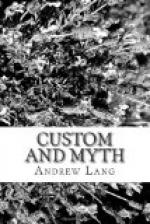Rowan, ash, and red threed
Keep the devils from their speed,
says the Scotch rhyme. Any fanciful resemblance of leaf or flower or root to a portion of the human body, any analogy based on colour, will give a plant reputation for magical virtues. This habit of mind survives from the savage condition. The Hottentots are great herbalists. Like the Greeks, like the Germans, they expect supernatural aid from plants and roots. Mr. Hahn, in his ’Tsui Goam, the Supreme Being of the Khoi Khoi’ (p. 82), gives the following examples:—
Dapper, in his description of Africa, p. 621, tells us:—’Some of them wear round the neck roots, which they find far inland, in rivers, and being on a journey they light them in a fire or chew them, if they must sleep the night out in the field. They believe that these roots keep off the wild animals. The roots they chew are spit out around the spot where they encamp for the night; and in a similar way if they set the roots alight, they blow the smoke and ashes about, believing that the smell will keep the wild animals off.
I had often occasion to observe the practice of these superstitious ceremonies, especially when we were in a part of the country where we heard the roaring of the lions, or had the day previously met with the footprints of the king of the beasts.
The Korannas also have these roots as safeguards with them. If a Commando (a warlike expedition) goes out, every man will put such roots in his pockets and in the pouch where he keeps his bullets, believing that the arrows or bullets of the enemy have no effect, but that his own bullets will surely kill the enemy. And also before they lie down to sleep, they set these roots alight, and murmur, ’My grandfather’s root, bring sleep on the eyes of the lion and leopard and the hyena. Make them blind, that they cannot find us, and cover their noses, that they cannot smell us out.’ Also, if they have carried off large booty, or stolen cattle of the enemy, they light these roots and say: ’We thank thee, our grandfather’s root, that thou hast given us cattle to eat. Let the enemy sleep, and lead him on the wrong track, that he may not follow us until we have safely escaped.’
Another sort of shrub is called abib. Herdsmen, especially, carry pieces of its wood as charms, and if cattle or sheep have gone astray, they burn a piece of it in the fire, that the wild animals may not destroy them. And they believe that the cattle remain safe until they can be found the next morning.
Schweinfurth found the same belief in magic herbs and roots among the Bongoes and Niam Niams in ‘The Heart of Africa.’ The Bongoes believe, like the Homeric Greeks, that ’certain roots ward off the evil influences of spirits.’ Like the German amateurs of the mandrake, they assert that ’there is no other resource for obtaining communication with spirits, except by means of certain roots’ (i. 306).




